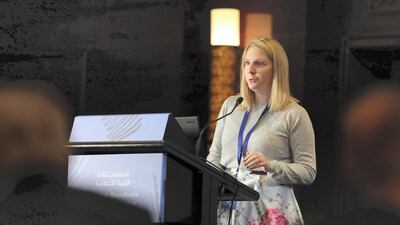Head teachers across the UAE believe staff need to be given specialised training to teach moral education classes in schools.
Moral education was introduced in private and government schools in September 2017, but educators believe more needs to be done for it to be successfully integrated into the curriculum.
At a meeting of more than 180 school principals from Dubai and the Northern Emirates, school leaders called for a concerted effort to be made to hire staff to specifically teach moral education.
Moral education lessons were introduced to instil tolerance, community spirit and compassion in pupils.
__________
Read More:
New UAE education policy will have morals and ethics at its heart
Hard work and good timekeeping: how the UAE's moral education drive aims to improve society
Moral education taught in UAE schools for the first time
_________
The subject is taught without textbooks and there are no exams.
Because few teachers have been trained on the subject, providing moral guidance to young minds is shared by a variety of educators, not all of whom are equipped for the role.
The topic was put in the spotlight during the first day of the Principals’ Roundtable for the UAE Moral Education Programme, held in Dubai Festival City on Tuesday.
A second event will be held in Abu Dhabi on Wednesday.
Nargish Khambhatta, principal of Gems Modern Academy in Dubai, said planning lessons on moral education is not suitable for every teacher.
“Some of the content of the curriculum is heavy and dry like financial literacy. It’s not everyone’s cup of tea to teach financial literacy," Ms Khambhatta said.
“Not every teacher is equipped to teach civic sense and Islamic culture.
"Training for teachers and identifying the right teachers for the right topic are very essential. We need extra training for these teachers."
At present, existing teachers at schools are taking moral education classes.
The school head explained that another challenge is the fact that parents are still to "buy in" to the importance of moral education.
"We need to involve parents in the teaching process to help them buy in to the idea. Schools should have projects that are interesting to them."
Mohamed Al Neaimi, director of educational affairs at the Crown Prince's Court, said schools had a positive attitude to incorporating moral education into the curriculum, though he admitted there were some teething problems as it remains a relatively new subject.
"Unlike other subjects where you are taught to be tested, here there are no tests. There is no pass or fail,” he said.
The moral education curriculum focuses on character development, morality, cultural studies, civic studies and community.
For Sheela George, principal of ASPAM Indian International School in Sharjah, it is crucial that a committee is established to develop a moral education strategy, as is the case with core subjects.
She, however, does not believes that schools need a recruitment drive, but can train existing staff to teach the subject.
“We can train teachers in financial literacy, entrepreneurship skills, civic sense," she said, encouraging schools to share successful practices.
"We do have training sessions for teachers, but we need more of these,” she said.
Zara Harrington, principal of Safa British School in Dubai, said schools need strong leadership and good teachers are key.
"I think there has to be enough freedom for schools to adapt the subject," Ms Harrington said.
"You have to have really strong leadership and very good teachers to implement it. Without that, no matter what the curriculum states it won’t be successful," she said.
Maryam Obeid Al Gharbi, principal of Al Ameer for Boys in Umm Al Quwain, said the biggest hurdle is encouraging pupils and schools alike to embrace change.
"To convince them is difficult sometimes. Give schools a chance to present noteworthy examples so that they have a chance to share their success stories,” she said.
Moral education explained
The moral education programme aims to ensure pupils are responsible and engaged citizens.
The moral education course works to build character of pupils, instills an ethical outlook, fosters community feel, and brings pupils closer to their culture.
The programme has four main pillars which include character and morality, individual and community, civic studies and cultural studies.
Pupils in public and private schools receive 45 minutes of moral education every week.
The course was initiated by Sheikh Mohammed bin Zayed, Crown Prince of Abu Dhabi and Deputy Supreme Commander of the Armed Forces.
The pilot scheme was trialed in 19 schools in January 2017, and moral education was implemented for grades one to nine in all schools across the country in September 2017.
In September 2018, moral education was extended to grades 10-12 in all schools across the country.


